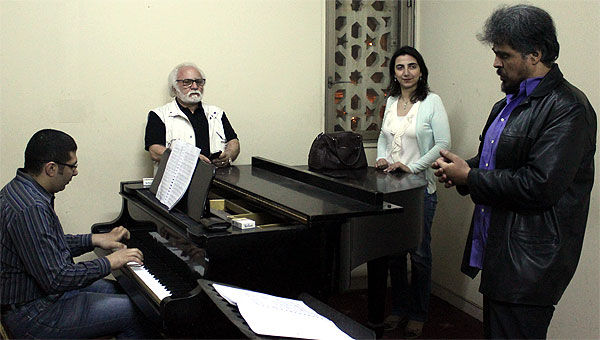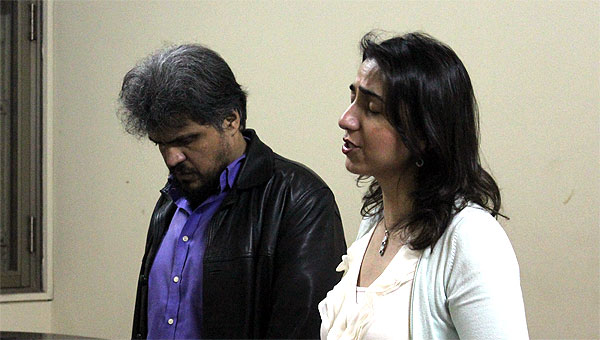In a rehearsal room of the Cairo Opera House, Sherif Elwan on piano accompanies bass Ahmad El-Shimi and soprano Alyaa Zohni. The duet is rehearsing one of the arias from an intermezzo in two parts, La serva padrona (The Servant Turned Mistress) by Giovanni Battista Pergolesi (1710-1736). The performance took place at the Opera House Small Hall on Thursday, 16 April.
For many reasons this production was special. With La serva padrona, as with other shows, the tenor Sobhi Bidair — one of the most active forces on Egypt’s art scene — gives the audience the chance to experience the Opera House Small Hall in a new way. This is also the first such work coming from the Talents Development Centre. On the other hand, the project lays the groundwork for the work of the planned Opera Studio, an entity catering to new vocal talents that will function as an arm of the Opera.
Bidair has scores of achievements to his name, singing in operas on local and international stages and serving as director of the Cairo Opera Company, a post he has held more than once. With the ability to perform Western pop as well as operatic music, Bidair’s name is also associated with the band Les Petits Chats and, later, Sobhi and Friends. Decorated with the title of Cavaliere and rewarded by the Egyptian government, Bidair was one of the first professors to take charge of a voice class at the Talents Development Centre on its opening in the early 1990s. Though he abandoned teaching at the centre for several years, he returned a few years ago.
La serva padrona is a completely new endeavour of the centre’s vocal class. This time, the performance uses only two out of over 30 singers taught by Bidair, and as the project grows, Bidair hopes to explore bigger productions at a later stage.
“During my directorship of the Cairo Opera Company,” he recalls, “we did one-act operas for the first time. The repertoire included works such as La voix humaine, all one-act operas by Rossini, many of which were not known to the Egyptian audience. We also staged West Side Story for the first time in Egypt. It was a special arrangement for percussion instruments. And we mustn’t forget that this was the first time the Opera Company performed Rigoletto, L’elisir d’amore, Don Pasquale. Those operas where re-staged later on. We had a lot of activities ... ”
With La serva padrona Sobhi returns to his interest in smaller operatic works, often lesser known to the Egyptian audience. “I was searching for something that would fit the young singers at the Talents Development Centre,” he says. “I always start with the voices as they dictate the capabilities, they dictate the choices.”
But there was another difficulty in the Pergolesi’s work: “La serva padrona is based on two characters, Uberto (bass Ahmad El-Shimi) and Serpina (soprano Alyaa Zohni), in addition to a silent actor, Vespone (Hassan El-Naggar). Unlike the big operas, in many smaller works, the soloists do not have the chance to rest backstage, their continuous presence on stage for over 40 minutes is essential to the thematic development.”

Rehearsal of La serva Padrona at the Cairo Opera. From left to right: Sherif Elwan (piano), Sobhi Bidair, Alyaa Zohni (soprano) and Ahmad El Shimi (bass). (Photo: Ati Metwaly)
The comic opera revolves around the elderly bachelor Uberto who, though he feels dominated by his maidservant Serpina, ends up marrying her. The simple story incorporates much wit and intelligently drawn characters who find themselves attracted one to the other.
Bass Baritone El-Shimi studied singing for over seven years under several professors before coming to Bidair in 2012. El-Shimi participated in a number of performances under the Talents Develpment Centre’s umbrella, singing arias. He also sang, accompanied by Sherif Elwan on the piano, at the Russian Cultural Centre. Working as a radio presenter at an English language channel in Egypt, El-Shimi dedicates his programmes to classical music, particularly opera.
Likewise Alyaa Zohni has a long history of vocal education at the Cairo Conservatory and the Talents Development Centre. She is a returning singer at the centre.
This is the first time that Bidair is presenting the newly discovered talent Sherif Elwan as accompanist. A neurologist by trade, Elwan’s journey with piano began at the age of 10. Moving between private tutors and courses in the Russian Cultural Centre as well as the Faculty of Music Education, Elwan took his exams at Trinity College, reaching the final, eighth level. While studying medicine, he was already giving solo recitals and accompanying singers on a range of stages, including the Gezira Sporting Club and Russian Cultural Centre in Cairo and in Alexandria. La serva padrona is his first Cairo Opera House performance.
The team emphasise the joy drawn from their work on La serva padrona, pointing to Bidair’s guidance and the knowledge he imparts of the work’s historical background. According to Bidair, one of the most important aspects of the project is that the team — though very small — is truly passionate about it.
With passion as its driving force, La serva padrona is not taxing the Opera’s budget. Benefiting from director Sherif Ramadan’s knowledge of the Opera’s hidden treasures, the team performs to scenography and costumes from storage. Ramadan, a director and choreographer at the Cairo Opera House with experience working with professional singers, gives life to La serva padrona, working on mise-en-scene and light design.
“I wish we could do more in scenography,” Ramadan explained, “but I am restrained by what is already available in the Opera’s storage. But on a positive note, the Cairo Opera Company staged a number of works set in Pergolesi’s times so it is not completely impossible to find elements that would also fit La serva padrona.”
Following Bidair’s cue, the accompanist will be seated on the stage, becoming part of the action.
The team expresses their hope that La serva padrona will be but the beginning of a significant project, with the Opera Studio mimicking its counterparts in international opera houses.
Bidair is clear about what steps he will be taking after La serva padrona, but he does not reveal the details. “Definitely the next project will be bigger and will involve the Talents Development Centre,” he says, but no more.

Rehearsal of La serva Padrona at the Cairo Opera: Alyaa Zohni (soprano) and Ahmad El Shimi (bass). (Photo: Ati Metwaly)
This article was originally published in Al-Ahram Weekly
Short link: